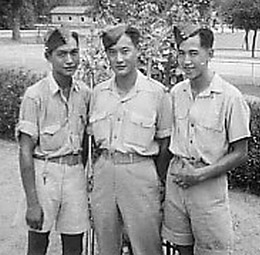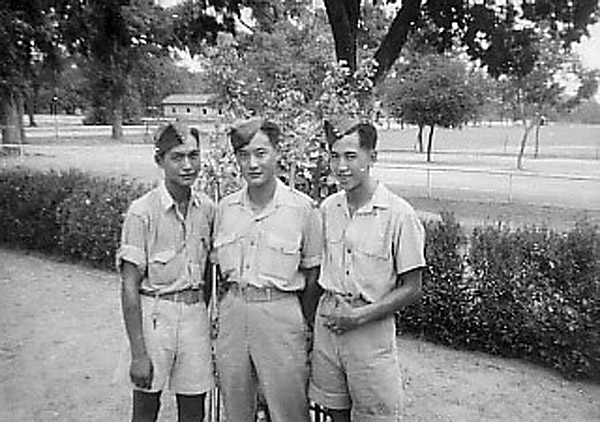Neill Chan
Neill Chan joined the Canadian Army in 1944 and was offered the chance to fight the Japanese as he knew the language as well as fluent Chinese. He was seconded to SOE, Special Operations Executive, in London. From there he went to India to decipher military communications. « View Transcript
Larry Wong (Interviewer)
Neill Chan was born in 1924. He was raised in Vancouver's Chinatown and when he finished high school, worked in the shipyards in North Vancouver. Neill joined the Army in 1944 and was sent to Maple Creek for training. Almost immediately, he was recruited to the elite guerrilla Force 136. Before he knew it, Neil was on his way to London, England. Why did they select you to go to London, England?
Neill Chan (Interviewee)
I don't know why um but they, we were sent sent to Ottawa first, and in Ottawa a sergeant asked me where, what unit I belonged to, and ah I told him. I said, "We just signed on for ah the Force 136," so he said to me, "You're going to be a spy." I told him, I said, "You're nuts." I signed up to be a fighting soldier and I left it at that, which came out to be true; and ah when we got there London, England, they ah they ah, in Aldershot they issue us rifles from the case cases and we just had to clean them up. We just clean it up for parade ah by lunch time and then we had to turn them all in; and that there we're told that we're in the British Army and we don't need the ah rifles.
Larry
What did you do after you were discharged from the Army then?
Neill
I don't know. I'm so confused over it because they they gave us a lecture in Eng in England and in and uh and they said, "To kill: to kill is all normal. If other people want to kill to kill you, they're willing to die; so they're willing to die -- you're willing to kill," so that kinda confused me all the way through ah; and the motto for the British soldier was: "Not to question where or why. The duty is to do or die." And that's their motto. And they expect us to live up to that.
Larry
Did you ever kill anyone?
Neill
Thank goodness no. (with the forces?) Didn't have to. When we were sent we were sent out in the bush I didn't; we were away from the enemy, miles and miles away, and then they're, most of us got malaria, sick from malaria. That's when ah that's when I went to the BMH. When I got out the BMH I met a sergeant who spoke perfect Chinese and he said to me in Chinese, "Don't go back. Come with me," so I didn't know what he - I didn't, naive in those days, so I went to him and he went and ah dismantled a couple of ah depots up on the Lido Road, the beginning of the Lido Road. And ah that's why ah I don't, I don't want to get involved with that because a lot of legal things that weren't supposed to be there and yet that was there.
Larry
So so overall what what did you think of your war experience and ...?
Neill
Oh, it's good. It taught me a lot of things. It taught me more tolerance, what I saw in in India and the other countries like England: ah made me more tolerant. And uh I always believe that uh when I went to school that Canada, the policy was "Born in this country, you you are part of this country;" so so never, regardless of my ethnic culture and all that, I still say, "I'll I'll join the Army and fight for this country and try and do for what's right."
Larry
But in the end did you feel that it was worthwhile joining up the Army and ah getting the right to vote?
Neill
Well, when I joined the Army I didn't care about the vote or not. (He laughs.) I didn't care about it. My aim was at that time was is join join up to fight the Japanese at that time, so when when they enlisted the whole bunches of us I was naive. I thought they were going to form a Chinese unit just like the ah Japanese unit from Honolulu; so I thought that was that until I got to Ottawa and that sergeant said to me, "Ah, you're going to be a spy." I told him, "That's bullshit."
Larry
So you never did become a spy.
Neill
Thank goodness. Anyone who was born in Canada, raised in Canada and earned his support to for living in Canada should put their devotion to Canada. That's the way I feel, and that's the way I've always gone. So whether we get ordered or discriminated against, whether your lack of education, you shouldn't feel that way. You just go ahead and and be a Canadian.
Did you Know?
Neill Chan has an ear for languages. A friend taught him Japanese while at Strathcona school and he learned Hindu when he was stationed in India.
Table of Contents
- John Ko Bong member of Operation Oblivion
- Mary Ko Bong an instrument mechanic
- Neill Chan deciphered communications
- Paul Chan served in the Second World War
- Roy Chan served in the Second World War
- Bill Chong served as Agent 50...
- George Chow trained as a gunner
- Marshall Chow a wireless operator
- Douglas Jung represented CA at UN
- Daniel Lee an aircraft mechanic
- Peggy Lee served in the home front
- Alex Louie trained in India to parachute
- Albert Mah flew 420 return trips from...
- Cedric Mah a pioneering bush pilot
- Roy Mah a pillar of the community
- Gordie Quan full military career
- Andrew Wong in US Merchant Marines
- Frank Wong in Holland for the liberation
- Henry Albert (Hank) Wong
- Larry Wong in Newfoundland Regiment
- Mary Laura Wong (Mah) a teletype operator
- Date modified:


